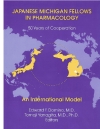Japanese Michigan Fellows in Pharmacology

|
Editor(s): Edward F. Domino, Tomoji Yanagita
Format: Hard cover ISBN-13: 9780916182113 Pages: 255 Publication date: 1999-07-01 Price: $49.99 |
|
|
We humans are a curious lot! We have within us the capacity to hate our fellow humans enough to destroy them, and the technology to destroy our entire planet. And yet we can also be compassionate, understanding and caring for those less fortunate. The incredible suffering and loss of human life for both the victors and the vanquished during World War II are well documented. The reconstruction of the devastated postwar Japan involved many changes in various aspects of Japanese society under American influence. One of these was in medical education and care. In this complex process of regrowth, former foes became friends.
The initiatives undertaken after 1945 resulted in the remarkable nation which is Japan today. Improvements in medical education and care were a priority because Japan at that time was years behind Western nations. There was a pressing need for help. Typical of Americans, various private organizations sent medical experts to Japan in a series of medical missions.
Thus it was that one of a number of pharmacologists, Maurice Seevers, was asked to participate. Dr. Seevers specifically was asked to advise the Japanese on teaching and research on the newer medicines then available in the United States. This he did with energy, enthusiasm, and showmanship, making an incredible impression. He initiated the collection of many precious drugs as gifts from American pharmaceutical and chemical companies and their distribution in Japan. In 1951, his demonstration that a morphine-induced coma is antagonized by nalorphine astounded Japanese students, pharmacologists, and administrators alike. Young Japanese pharmacologists wanted to learn more of American pharmacological advances.
So began the story of the Seevers Michigan
Fellows. This book documents the impact
Michigan had on them, and their impact on
those Michigan professors with whom they
interacted as postdoctoral fellows in pharmacology
It should be told if to no one else then
at the very least to the persons involved. This
book is written especially for them. All of us
have been rewarded for our interactions and
cooperation. It is hoped that this program
may continue into the twenty-first century
Perhaps there is a lesson to be learned for all.
You, the reader, can be the judge.
Read more (large pdf)